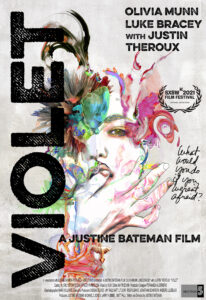TIFF Review: In Empowering “Violet,” the Voice of Male Derision Is Real
Written by: Christopher Llewellyn Reed | September 9th, 2021

Violet (Justine Bateman, 2021) 3 out of 4 stars.*
An experimental work that examines the fraught realities of female identity, Violet, from actress-turned-director Justine Bateman (here making her feature debut behind the camera), stars Olivia Munn (Love Wedding Repeat) as a woman consumed by her own insecurities and fears. Those take actual voice inside her head, spoken by a deriding, unseen male (Justin Theroux, Mute) who constantly criticizes. At the same time, onscreen text fills in additional desires, sometimes in opposition to, and at other times in agreement with, the voice’s instructions. It’s a living nightmare.
A film executive at a small production company, Violet should be confident of her skills and upward career trajectory but is instead hobbled by self-loathing. In flashbacks, we see past mistakes, the voice egging her on to do that which she should definitely not do. Further back, we get a sense of the roots of this pathology in childhood. It’s amazing she has managed to accomplish anything at all.

In the present, Violet allows both her boss and underlings to disrespect her, but no one is harder on her than that internal voice. She cannot even make her own romantic decisions: should she date her hunky childhood best friend, Red (Luke Bracey, American Dream), a mere screenwriter but the man she really wants, or the studio suit whose blessing would open up further opportunities? To us, the choice is obvious, but to Violet, it’s an impossible one to make.
At work, she really wants to make the small arthouse project she dreams about, but the head of the company (Dennis Boutsikaris, Impossible Monsters) pulls his support from the movie as soon as Violet inadvertently upstages him in a meeting. It turns out that they have sexual history, which fits her bad-decision paradigm. And on and on it goes; in all cases, she is not worthy of joy, so why bother trying?

In powerful bursts, however, Bateman changes the narrative in unexpected ways, though at the end of the day they’re not all that surprising. Nor does the movie entirely avoid schematic posturing. There is also some confusion as to the polemic: is this an attack on the patriarchy, which it often seems to be, or merely a portrait of an individual in need of personal liberation? The fact that Violet’s oppressors (other than the voice) are as often female as male complicates matters. Nevertheless, the film is effective even when didactic, and Munn is terrific. And if we have to work a little harder to discern the true intent, what’s wrong with that?
*Adapted from the capsule review in my TIFF 2021 curtain raiser.

